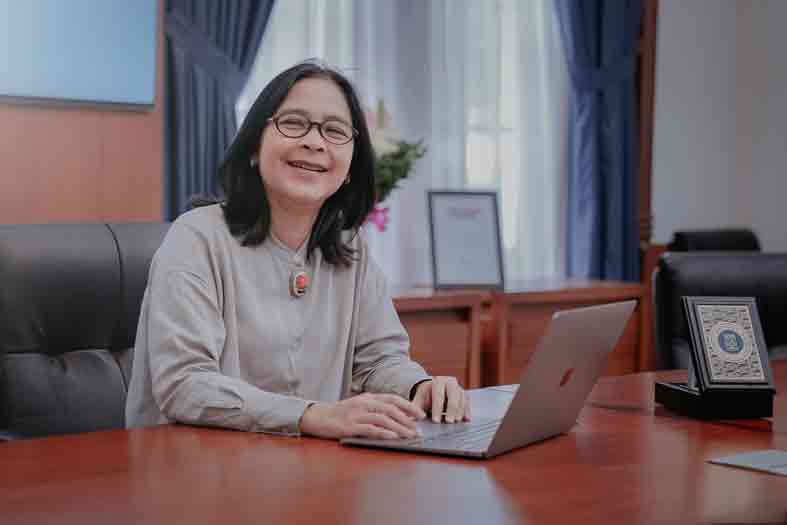
In the Final Draft of the National Long-Term Development Plan, known as the RPJPN 2025-2045, the Vision of Indonesia is outlined as "Archipelagic Nusantara in Sovereign, Advanced, and Sustainable." One of the fundamental strengths that Indonesia possesses is its human capital or human potential. Within this RPJPN, the stages of human capital development encompass the fulfilment of basic services, the acceleration of the development of quality and inclusive human resources, the strengthening of human resources competitiveness, and the realization of superior Indonesian individuals.
The quality of human resources in this article is described in three aspects: (i) knowledge mastery, (ii) competence, and (iii) the ability to learn. Knowledge mastery is achieved when a student completes their studies at a higher education institution (HEI). This knowledge mastery provides the ability to understand specific phenomena or problems.
By undergoing various practical exercises during their studies, students are able to solve problems in a specific field, in a measurable and tested manner. This is the competence they acquire. In addition to these two aspects, through the entire learning process on campus, students also learn about "how to learn." This provides them with the ability to continue learning. These three aspects determine the quality and competitiveness of human resources. Therefore, an HEI needs to be able to continuously improve these three aspects of human resource quality.
Efforts to improve the quality of knowledge in human resources, particularly graduates of higher education institutions (HEIs), must be supported by enhancing the quality of knowledge within the HEIs themselves. The key step here is to increase the intensity and quality of research conducted by the faculty members. The higher the quality of knowledge possessed by the faculty, the higher the quality of knowledge acquired by the students.
The campus should create a conducive academic atmosphere and foster an excellent scientific culture. This will shape the character of students who are familiar with knowledge, uphold truth, and value honesty.
To enhance the competence of graduates, HEIs need to expand and strengthen the relevance of all Tridharma activities (teaching, research, community service). This can be achieved through increased responsiveness. The more responsive a campus is to emerging issues in society, the higher the relevance of Tridharma activities on campus towards those issues.
Lastly, the aspect of learning ability is crucial for the competitiveness of human resources. In the global arena, knowledge continues to evolve dynamically, and the challenges in the working world are constantly changing. Even if we have a high level of knowledge mastery and competence, they can become irrelevant when changes occur in the work environment.
To be competitive, the ability to adapt to change and anticipate challenges and opportunities is necessary. This can be achieved by continuously learning new things and synthesizing the new with the existing knowledge. The key here is the ability to think multidisciplinary and produce synthesis in the complexity of problems.
Here are some steps taken by Institut Teknologi Bandung (ITB) in its efforts to enhance its contribution to the development of human resources in Indonesia. These steps include the development of an Excellent Scientific Culture (BIU) program, a multi-campus and multidisciplinary program, as well as the development of a Science Techno Park (STP) program.
The BIU strengthening program was developed with the aim of making research the "intellectual lifeblood" on campus. It is expected that this program will strengthen ITB's capacity as a knowledge institution and foster a culture of love for knowledge, multidisciplinary, and a commitment to truth, honesty, and equality.
Not long ago, ITB launched its multi-campus and multidisciplinary programs. In the past, ITB was synonymous with the campus on Ganesha Street in Bandung. Over time, ITB established campuses in Jatinangor, Cirebon, and more recently, Jakarta.
ITB Jatinangor campus focuses on the green issues and global climate change, as well as supporting the development of Sumedang and its surrounding areas. ITB Cirebon campus emphasizes creative economy, creative cities, and the development of the Cirebon, Patimban, and Majalengka regions (Rebana).
ITB Jakarta campus facilitates interactions between ITB academics, ITB alumni, and professionals from various fields. All ITB campuses are united by ITB's Vision/Mission, Academic Norms/Ethics, and Excellent Scientific Culture. The diversity of ITB campuses is expected to broaden and strengthen ITB's responsiveness and relevance, and in turn, enhance the competencies of ITB graduates.
Through a lengthy process, ITB has developed the ITB Science Techno Park (STP). The STP plays a role in expanding the outreach of Tridharma activities at ITB by facilitating research and innovation that is responsive to the dynamics of societal issues. Research and innovation activities involve partnerships with various private enterprises, both local, national, and international.
The STP ITB is not a for-profit institution. However, with the functioning of the STP ITB, it is expected that science-based start-ups will emerge, which in turn will have an impact on economic growth and address social/environmental issues.
In conclusion, higher education institutions (HEIs) play a key role in developing Indonesia's excellent human resources. To fulfil their role optimally, HEIs need to continuously strengthen their internal capacity and develop measured and tested programs.
Regarding the implementation of the RPJPN 2025-2045, the strengthening of higher education institutions should be carried out as early as possible.
Reini Wirahadikusumah,
Rektor Institut Teknologi Bandung
As published in Kompas.id, June 28th, 2023